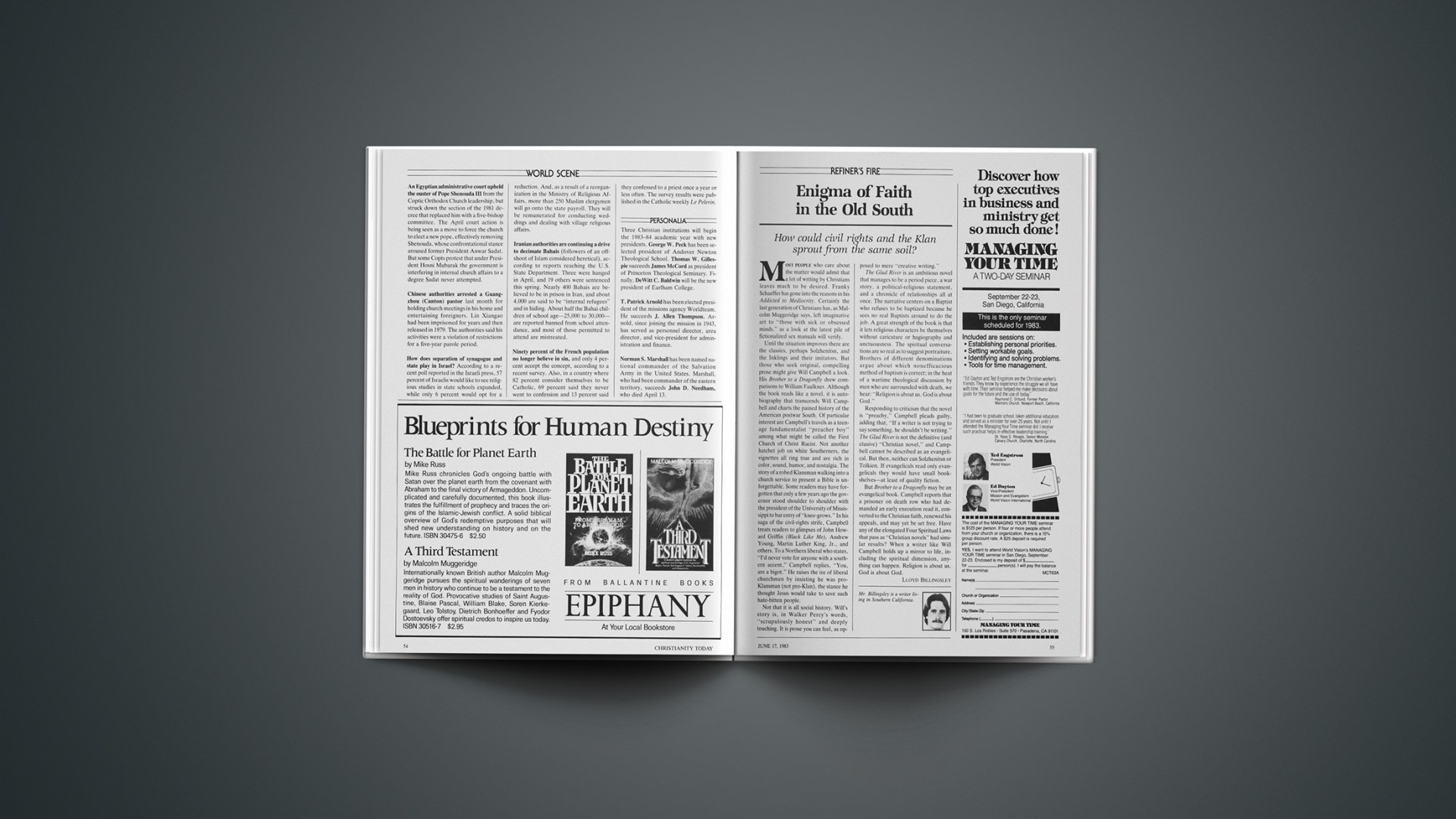How could civil rights and the Klan sprout from the same soil?
Most people who care about the matter would admit that a lot of writing by Christians leaves much to be desired. Franky Schaeffer has gone into the reasons in his Addicted to Mediocrity. Certainly the last generation of Christians has, as Malcolm Muggeridge says, left imaginative art to “those with sick or obsessed minds,” as a look at the latest pile of fictionalized sex manuals will verify.
Until the situation improves there are the classics, perhaps Solzhenitsn, and the Inklings and their imitators. But those who seek original, compelling prose might give Will Campbell a look. His Brother to a Dragonfly drew comparisons to William Faulkner. Although the book reads like a novel, it is autobiography that transcends Will Campbell and charts the pained history of the American postwar South. Of particular interest are Campbell’s travels as a teenage fundamentalist “preacher boy” among what might be called the First Church of Christ Racist. Not another hatchet job on white Southerners, the vignettes all ring true and are rich in color, sound, humor, and nostalgia. The story of a robed Klansman walking into a church service to present a Bible is unforgettable. Some readers may have forgotten that only a few years ago the governor stood shoulder to shoulder with the president of the University of Mississippi to bar entry of “knee-grows.” In his saga of the civil-rights strife, Campbell treats readers to glimpses of John Howard Griffin (Black Like Me), Andrew Young, Martin Luther King, Jr., and others. To a Northern liberal who states, “I’d never vote for anyone with a southern accent,” Campbell replies, “You, are a bigot.” He raises the ire of liberal churchmen by insisting he was pro-Klansman (not pro-Klan), the stance he thought Jesus would take to save such hate-bitten people.
Not that it is all social history. Will’s story is, in Walker Percy’s words, “scrupulously honest” and deeply touching. It is prose you can feel, as opposed to mere “creative writing.”
The Glad River is an ambitious novel that manages to be a period piece, a war story, a political-religious statement, and a chronicle of relationships all at once. The narrative centers on a Baptist who refuses to be baptized because he sees no real Baptists around to do the job. A great strength of the book is that it lets religious characters be themselves without caricature or hagiography and unctuousness. The spiritual conversations are so real as to suggest portraiture. Brothers of different denominations argue about which nonefficacious method of baptism is correct; in the heat of a wartime theological discussion by men who are surrounded with death, we hear: “Religion is about us. God is about God.”
Responding to criticism that the novel is “preachy,” Campbell pleads guilty, adding that, “If a writer is not trying to say something, he shouldn’t be writing.” The Glad River is not the definitive (and elusive) “Christian novel,” and Campbell cannot be described as an evangelical. But then, neither can Solzhenitsn or Tolkien. If evangelicals read only evangelicals they would have small bookshelves—at least of quality fiction.
But Brother to a Dragonfly may be an evangelical book. Campbell reports that a prisoner on death row who had demanded an early execution read it, converted to the Christian faith, renewed his appeals, and may yet be set free. Have any of the elongated Four Spiritual Laws that pass as “Christian novels” had similar results? When a writer like Will Campbell holds up a mirror to life, including the spiritual dimension, anything can happen. Religion is about us. God is about God.
LLOYD BILLINGSLEY1Mr. Billingsley Is a writer living in Southern California.










